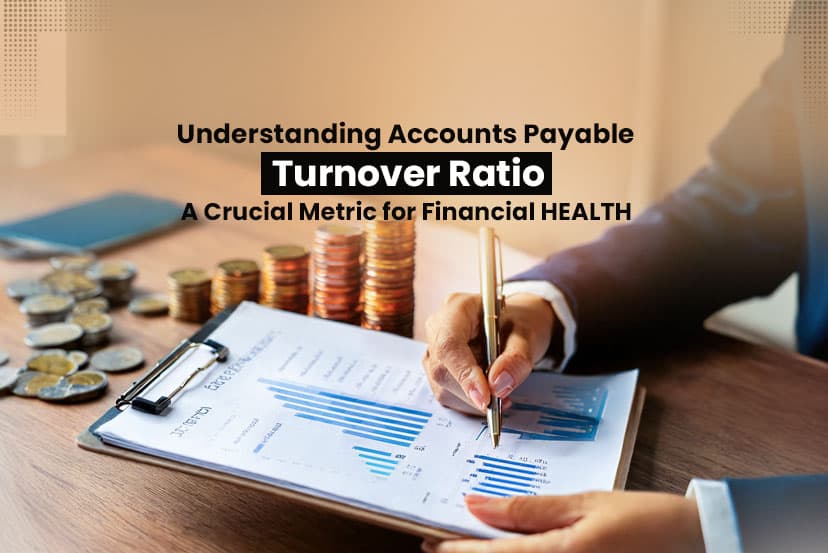In any business, being smart in managing the outflow of cash could be the key difference between success and failure. While revenue growth attracts a lot of attention, financial discipline will be what carries an organization in the long run. The accounts payable turnover ratio is one of the most useful metrics to monitor the short-term financial health. This important measure provides insight into the speed of a business in paying its bills and the efficacy of vendor management, cash flow timing, and financial reliability.
Why This Ratio Matters More Than You Think
Before we find out how we can calculate and use this ratio, let’s know its importance in everyday operations.
What is Accounts Payable Turnover Ratio?
Accounts payable turnover ratio calculates the number of times that the enterprise pays its suppliers within a given time, usually a fiscal year. The higher the ratio, the quicker a company is repaying its debt, hence suitable liquidity. A bad ratio can indicate a poor cash flow or unduly long payment terms.
The Basic Formula Explained
The accounts payable turnover ratio is calculated by the following formula –
Accounts Payable Turnover Ratio = Cost of Goods Sold / Average Accounts Payable
In which –
- COGS is an aggregation of the direct costs of manufacturing goods or services
- Average accounts payable is calculated as the sum of the closing balance and the opening balance of accounts payable divided by 2
The formula provides a numeric score that can be cross-checked over time or compared to industry averages.
Interpreting the Ratio for Business Insight
Learning the meaning of the ratio enables companies to make wiser financial moves.
What a High Ratio Indicates
A good accounts payable turnover ratio is an indication that the business is paying its suppliers quickly. This may be a good indication of strong cash flow management and effective vendor relations. However, it can also show the lost opportunities to maximise the working capital by utilising the longer credit terms.
What a Low Ratio Might Mean
The poor ratio may be an indicator that implies slow payments, utilisation of supplier credit, or even cash bottlenecks. But some industries use long payment cycles, and this is not always the point of financial pressure.
Why It’s Critical to Track This Ratio
The accounts payable turnover ratio is not only an internal ratio. It moulds the external relations and the financial possibilities in the future.
Enhancing Supplier Trust
Clients who can pay on time are appreciated by the vendors. A stable turnover ratio evidences a steady partner and has the potential to receive better credit terms, special discounts, and even special offers. It is a silent but strong negotiating weapon.
Strengthening Cash Flow Planning
Tracking the number of times you are paying the suppliers will enable you to estimate outflows better. This increases the realistic aspects of cash flow forecasting, and you will not experience shortages at important business cycles.
Supporting Loan or Investment Applications
The accounts payable turnover ratio is the ratio considered by banks and investors as a measure of financial responsibility. A balanced ratio will help boost your chances of acquiring funding or expanding operations.
Using the Ratio Strategically
When you have a constant watch over the ratio, you can balance financial practices and even strategise.
Identify Changes in Supplier Behaviour
The sudden decline in your ratio can be a signal that your suppliers have changed their terms to longer payment terms, or your invoices are not being paid on time. Knowledge of these changes enables you to make sound decisions on contract renewal or procurement changes.
Align Payment Practices with Business Goals
In a growth period, when you have to save money, stretching your payment terms just enough so you do not hurt relationships can unlock working capital. The accounts payable turnover ratio can provide you with a real-time view of how far you are pushing limits.
Compare with Industry Averages
The level of turnover is naturally higher or lower in some industries. Retailers tend to pay quickly because they have limited stocks, whereas manufacturers might need a longer cycle period. Industry benchmarking will also help you to rate your business.
Improving the Turnover Ratio
A bad or uneven ratio does not mean failure–but merely indicates that a company should work on its processes.
Automate Accounts Payable
Digitalisation of the process shortens the delay in the approval and payment of invoices. Automation will go a long way in enhancing your accounts payable efficiency, hence a healthier turnover ratio.
Standardise Vendor Terms
When negotiating with your suppliers, bargain for even payment schedules to level your payment schedule. It also becomes easy to keep track of the ratio without having fluctuations between vendors.
Monitor Weekly or Monthly
You should not wait until the year-end to audit your ratio. Tracking it regularly can make your financial choices proactive, adjust your payment habits, or reveal red flags in time.
Elevate Your Financial Health with Smarter Payables
The accounts payable turnover ratio is a simple but effective ratio. It is not just an indicator of how quickly you pay your suppliers; it gives an insight into your financial policy, relations with suppliers, and control over cash flow. Through monitoring this ratio over time, reacting to what it shows, business enterprises are set to realise frictionless operations, better credit terms, and enhanced financial stability.
Credlix empowers companies to manage their business financial measures, with tools to observe and manage their accounts payable turnover ratio in real time. Whether you want to streamline your payment to suppliers or require access to working capital, our technically powered platform keeps your business agile, fast, and financially resilient.




